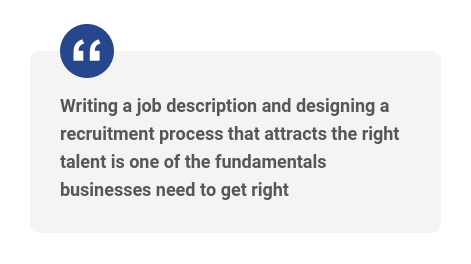Understanding your entire recruitment process can help protect your brand.
What makes an efficient hiring process?
An efficient hiring and candidate onboarding process for all businesses is crucial.
Let’s look at two important factors you should consider when you’re measuring success:
- Time-to-hire. This refers to how quickly an employee is recruited from the initial interview to starting. Nearly half of HR directors believe the recruitment process takes longer now than it did three years ago[2]. Last year, the typical time to hire within the UK was around 4 weeks. Other research suggests this can take even longer.
- Cost-per-hire is used to measure the cost efficiency of the hiring process. It refers to how much it costs for each person to be employed. This is estimated to cost on average of £30,614 to replace a staff member[3].
Reducing the time it takes to hire and the cost of each hire is important. The three rewards of this will be a better experience for your new recruits as well as reduced cost and better use of time and resource.
But what could stop this being achieved? Sometimes it’s simple things such as having too many stakeholders in the hiring process or not having the right job description for the role from the outset.
Hiring the right people for the role is crucial
 Hiring the right people for the role requires not only a skill assessment but quick and efficient processes that are consistent and reliable. This, in turn, will ensure you retain them through to starting.
Hiring the right people for the role requires not only a skill assessment but quick and efficient processes that are consistent and reliable. This, in turn, will ensure you retain them through to starting.
Let’s have a look at the basic processes from writing the job description through to a post offer acceptance:
You need to understand the competencies that are required for the role you are recruiting for. And, this may need to be created by the manager, or team, who have this intricate knowledge.
An accurate description of the role must be thought out and written clearly in simple non-corporate language that is authentic, specific, exciting and engaging. It may seem basic guidance but it’s important that you objectively measure competencies through your interviews, assessment centres and competency tests.The job specification can act as a crib sheet to refer to or measure against.
Strengthening the candidate experience post offer acceptance
With the right due diligence checks in place, you are more likely to hire the right people for the right role, reduce your exposure to risk and maintain your brand reputation
Director checks are important when hiring business leaders. This simple check can look into previously held directorships, as well as any disqualifications on their record.
A current or previous directorship on a candidate’s record could potentially cause a conflict of interest situation for your business. Through highlighting any previous and existing directorships, you can have the confidence you need to ensure that what a candidate is telling you is correct.
Employing the right people for the level of responsibility involved in the role is essential. Checking qualifications and obtaining experience based references can help this. (We can help you do this).
If you are recruiting into regulated roles, then completing the correct screening checks is compulsory in order to adhere to regulation.
Screening efficiently from when you offer a job can help you to identify the right people upfront including checking specific elements such as their right to work (which if not completed can result in a £20,000 fine per employee employed illegally[4]).
Many forget that these background checks also impact the candidate and therefore open communications and keeping the candidate regularly updated can give positive outcomes.
So what does a good candidate experience look like, pre and post-offer?
A good candidate experience should:
- Be clear on the role requirements from the outset
- Provide regular communications, informing and updating candidates on the stage they are at in the screening process
- Ensure any candidate is treated fairly and respectfully
- Have the candidate at the front of your mind
- Consider your internal and external regulatory requirements
- Be accessible, make it easy and be intuitive with your recruitment approach
- Giving access to the application across multiple devices is a must
Vetting checks allow you as an employer to have greater confidence in your hiring decisions whilst mitigating potential risk and saving you money. You can select the checks that are the most relevant to the role and industry as well as tailored checks for your business needs.
Find out more about how our Experian Background Checking solutions can help you.
[1] Networx Innovate 2016
[2] http://www.hrmagazine.co.uk/article-details/recruiting-new-candidates-takes-a-month
[3] http://www.hrreview.co.uk/hr-news/recruitment/it-costs-over-30k-to-replace-a-staff-member/50677
[4] https://www.gov.uk/penalties-for-employing-illegal-workers
